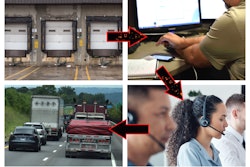A significant drawback of establishing motor carrier authority and relying on brokers -- particularly brokers with whom you have only scant history of doing business -- is the risk of nonpayment.
Clearly, nonpayment has been an issue for plenty owner-operators in Overdrive‘s audience over the years. In response to polling, three in four reported taking some recourse in the event of nonpayment. If your business is stiffed by a broker or freight forwarder that has gone broke, or perhaps even had no intention to pay to begin with, the situation may seem hopeless, yet with the right strategies you can still recoup a portion or even all of the unpaid freight bill.
In the video above, originally part of Overdrive's Trucking Law series, attorney Paul Taylor, managing partner of his Truckers Justice Center firm and a lawyer who has represented drivers and owner-operators for three decades, has produced a handy guide to track down responsible parties and, potentially, payment.
Knowing who you're dealing with -- and the crucial differences between a freight broker and a freight forwarder -- is the first step. This distinction determines who a carrier can go after for payment.
Taylor also explains that understanding and reading the fine print of a broker's master hauling contract is key in determining who the carrier can look to for payment.

Taylor's guide also goes into Section 7 of the Uniform Bill of Lading, when a broker's bonding company or trust fund is liable for payment, and if companies are entitled to payment from a defunct broker's bank.
[Related: Convoy's unpaid truckers: Where to seek payment?]
How to file against a broker's required surety bond
Often enough in nonpayment cases, it's filing against the bond that is the principal remedy.
Federal rules pertaining to broker surety filings haven’t changed much since the Federal Motor Carrier Safety Administration raised the minimum bond/trust amounts years ago from $10,000 to $75,000. That boost meant an added measure of financial security for owner-operators who have to resort to filing a claim with the surety provider after nonpayment.
As suggested earlier, the most high-profile filing incidents involve brokerages in trouble, or crooks in business for the sole purpose of defrauding carriers before their sureties are canceled and they disappear into the ether or ultimately face consequences, as in one relatively recent case. Yet know that if a broker is late on payment, odds are you’re not the only carrier out there who’s thinking about filing.
But if the broker closes and the broker’s bond limit doesn’t cover all debts, claims are typically paid on a “pro rata” basis -- a percentage of what each carrier is owed.
[Related: The double brokering scourge: How it happens, how to fight back]
In cases of broker business failure, thus, getting your claim in early may not be particularly helpful, though in practice an initial claim has also been known to be that extra nudge that pushes a recalcitrant broker over the finish line to finally paying what it owes. Such an outcome ultimately avoids what can be a time-consuming process of filling out paperwork and collecting load documentation, detailed in part below.
Determine when it’s time to file. After a broker has not paid within the contracted time, and particularly if the broker is not responding to your efforts to collect, it makes sense to file. Though the profusion of mobile technologies have sped up the payment process in recent years with technologically sophisticated freight middlemen, contracts can state any time for payment -- 30, 60 or 90 days after delivery all remain somewhat common.
Determine if the load is covered by surety regulations. Notably, intrastate loads (running point to point within a single state) and loads of exempt commodities (fresh produce and the like — find a full list here) are not covered by the bonding requirements.
Find the broker’s surety provider.
- Visit the company-lookup page at Safer.gov, then enter the broker’s DOT number, MC number or name and click “Search.”
- Use of a DOT or MC number, if correct, will take you directly to the broker’s basic information page. If you searched a name, you may be presented with a list of brokers from which to choose. Once you’ve located the correct one and are on the basic information page, in the box headed “Other information about this carrier,” click through the “Licensing and Insurance” link to FMCSA’s public Licensing and Insurance website. That’s where insurance/surety information and an authoritative history for any entity, among other data points, are available.
- Another search page will then come up, with the DOT number field already populated. Click the box to prove you are not a robot, and click through to the broker’s Licensing and Insurance main page.
- When the broker you’re filing against comes up, click the “HTML” button to view licensing information on the web page or “Report” to download a pdf. On the pdf, the surety provider is listed under “Active/Pending Insurance” near the bottom. If you’re viewing the HTML report, click the “Active/Pending Insurance” hyperlink for the surety provider’s information. It’s in this view that you’ll see a flag on any broker whose bond is within 30 days of either ending its active term or being canceled for reasons of valid claims filed against it. Overdrive‘s reported on this flag, which some around the business view as a tool to prevent claims from fraudulent brokerage operators who would attempt to take advantage of the 30-day notice process required of surety providers before canceling a surety for good. Congress in 2012 directed FMCSA to adopt a process to immediately suspend such brokers upon notification provided by the surety or trust fund provider. After more than a decade of delay, the agency's moved in recent years to finally implement this process, but the immediate-suspension authority isn't scheduled to go into effect until January of 2025. And given recent news the FMCSA sought to delay that date by a year for technical reasons, truckers will wait until 2026.
[Related: FMCSA tightens the screws on brokers 'who do not intend to pay' carriers: Final rule]
- Pending FMCSA buttoning up its enforcement procedures, if you’re vetting a broker before taking a load and see “This entity has a pending insurance cancelation” on its Active/Pending Insurance page, hit the back button on your browser and click through the “Authority History” link at the bottom of the page. If the broker’s been in business for well less than a year, the pending cancelation could be considered a red flag. You can contact the broker’s surety provider to find out definitively whether the pending cancellation is a routine matter or due to a run-up in claims. If the latter, stay away.
Read next: Beware of double brokers: Getting involved with one can be a huge knock on credibility












